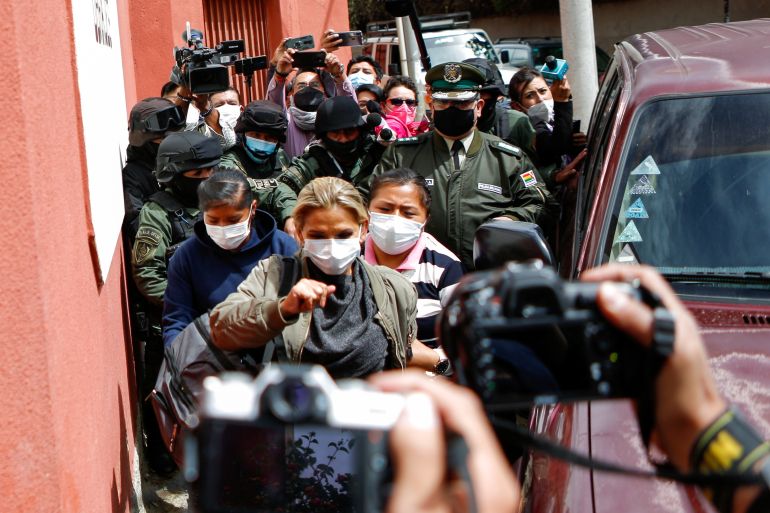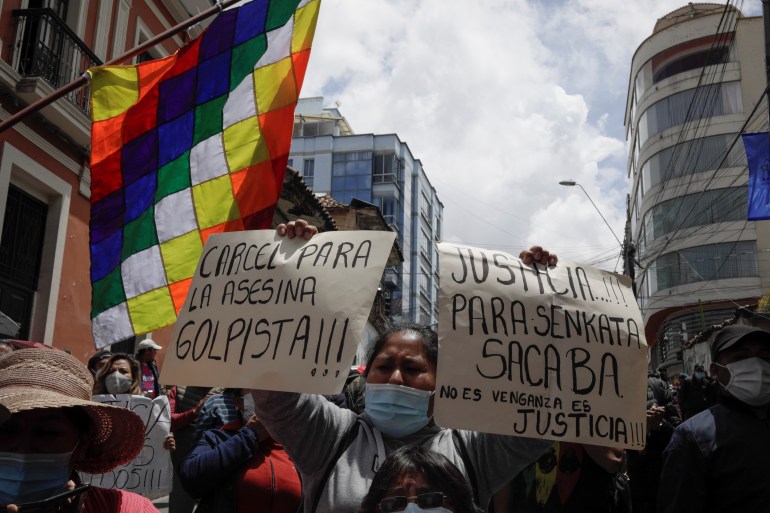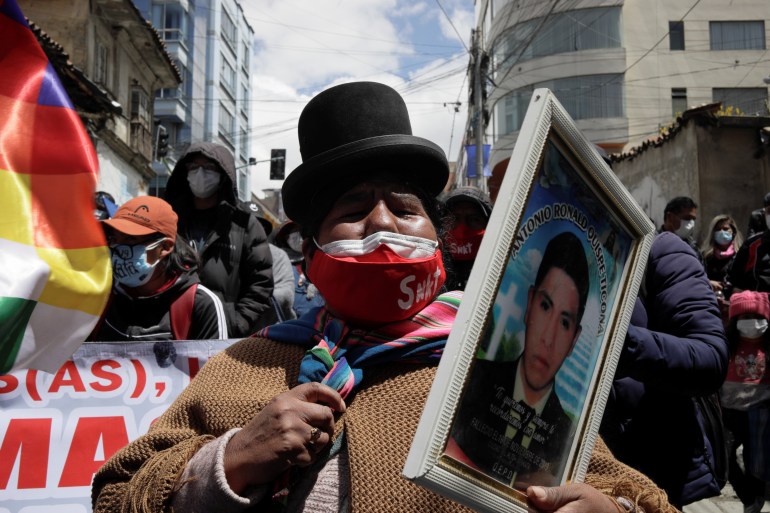Bolivia’s Jeanine Anez ordered to four months pre-trial detention
The former interim president is charged with terrorism, sedition and conspiracy in relation to events that began in 2019

A judge ordered Bolivia’s former interim President Jeanine Anez to four months of preventative detention for her role in the ouster of Bolivian leader Evo Morales in 2019.
Prosecutors have charged Anez – a conservative politician who took over as president after Morales was pushed to resign in October 2019 – and two other former members of her cabinet with terrorism, sedition and conspiracy. Morales and his allies say the events constituted a coup.
Keep reading
list of 3 itemsEvo Morales returns to Bolivia from exile in Argentina
Bolivians vote in local, regional polls amid COVID-19 concerns
During a virtual court hearing due to the coronavirus pandemic, local media reported that judge Regina Santa Cruz on Sunday night backed prosecutors’ charges against Anez and ordered that she be placed in four months’ of detention and be sent to a women’s prison in the Bolivian city of La Paz.
Former Minister of Justice Alvaro Coimbra and former Minister of Energy Rodrigo Guzman were also charged and sent to pre-trial detention.

Anez published the order for her arrest on Friday, and was detained on Saturday. She denies that a coup took place and alleges that Morales had resigned and fled the country.
“They are sending me to 4 months in detention to await the trial for a ‘coup’ that never happened,” Anez said in a Tweet late on Sunday.
Como hemos denunciado, el MAS decide y el sistema judicial obedece: me envían 4 meses detenida para esperar el juicio por un "golpe" que nunca ocurrió. Desde aquí llamo a Bolivia a tener fe y esperanza. Un día, entre todos, levantaremos una Bolivia mejor.
— Jeanine Añez Chavez (@JeanineAnez) March 15, 2021
Translation: As we have denounced, the MAS decides and the judicial system obeys: they are sending me to 4 months in detention to await the trial for a “coup” that never happened. From here I call on Bolivia to have faith and hope. One day, together, we will build a better Bolivia.
Bolivia’s Minister of Justice and Institutional Transparency, Ivan Lima, during an interview with local media on Sunday night said additional charges will be made against Anez and members of her cabinet for corruption and human rights violations. Lima said that his ministry would request up to 30 years in prison for Anez.
Anez’s arrest stems from events that took place starting October 2019 when leftist leader Morales ran for a fourth term in office, defying the nation’s term limits.
Morales, the Andean Nation’s first Indigenous president, was a widely popular leader during his nearly 14 years in office. But he saw his popularity dwindle amid accusations of mismanagement and a refusal to relinquish power.
The results of the presidential elections, which Morales said he won, were dogged by allegations of voter fraud, igniting weeks of nationwide protests. Following pressure from the armed forces who pulled their support of the government, Morales announced his resignation in November 2019. He then fled the country first to Mexico, and then to Argentina.
Over 30 Morales supporters were killed during protests after his resignation.
Morales’s ouster also prompted the resignation of then-Vice President Alvaro Garcia Linera as well as multiple people in the line of succession, clearing the way for Anez, 53, a previously little-known senator, to assume the presidency.
Although she was expected to fill in as interim president and charged mainly with holding a rerun of presidential and legislative elections, Anez began undoing Morales’s legacy and arresting his supporters for what were widely seen as political reasons.
During her one year as interim president, Anez’s administration came under accusations of corruption, mishandling of the coronavirus pandemic and imposing increasingly authoritarian rule. She withdrew her candidacy for president in September.
Como ex Presidente de #Bolivia y Presidente del MAS-IPSP no me cansaré de pedir justicia para 36 víctimas fatales, más de 800 heridos, 1.500 detenidos ilegalmente, centenar de perseguidos judicialmente y exiliados y asedio a Embajada de México, con proceso justo y sanción en ley.
— Evo Morales Ayma (@evoespueblo) March 14, 2021
Translation: As a former President of Bolivia and President of the MAS-IPSP I will not tire of asking for justice for 36 fatal victims, more than 800 injured, 1,500 illegally detained, hundreds of judicially persecuted and exiled, and the siege on the Mexican Embassy through a fair process and sanction by law.
Bolivian national elections were held in October 2020, which Morales’s Movement Towards Socialism (MAS) party won by a landslide, paving the way for Morales to return to Bolivia. Luis Arce, who Morales had named as a candidate, became president in November.

Morales sent a series of Tweets over the weekend saying members of his government resigned in 2019 as a result of pressure and violence perpetrated against their homes. He said allegations of fraud were never proven, and the fact that the MAS party won by 55 percent in the most recent election is proof of the popular support his party enjoys.
Anez’s arrest has garnered international concern.
Stephane Dujarric, spokesperson for United Nations Secretary-General Antonio Guterres, in a statement on Sunday called on the importance of “upholding due process” and ensuring “full transparency in all legal proceedings”.
The United States embassy in a tweet urged the upholding of “all civil rights and due process guarantees” and the European Union issued a statement calling on different sides of the government to deal with the events “within the framework of a transparent judicial process and without political pressure, with full respect for the independence of the powers”.
The Catholic church called for the “immediate release of the detainees”.